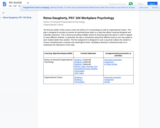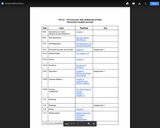
PSY 104 Workplace Psychology
Focuses on a number of important factors for effective performance in the workplace. Includes interpersonal skill development and communication, understanding individual differences, developing conflict resolution skills, group behavior, problem solving and decision making, becoming an effective leader; motivation, goal planning, diversity, stress management, improving career management skills, enhancing ethical behavior, and managing various work conditions. Covers important workplace laws and regulations in the United States. F, W, Sp, Su.
The first two weeks of this course covers the history of I-O psychology as well as organizational culture. This plan is designed to provide an avenue for teaching these topics in a way that utilizes universal designed and culturally responsive. This is done by providing multiple means for learning about the topics in order to appeal to many different students. In particular, the topic is introduced using three different texts as one may speak to each student better than another. The first assignment is designed in such a way that it allows the student to choose something that is relevant and meaningful to them. Workplace diversity is introduced early on to emphasize the importance of this topic.
- Subject:
- Psychology
- Social Science
- Material Type:
- Module
- Unit of Study
- Author:
- Reina Daugherty
- Date Added:
- 11/09/2020
